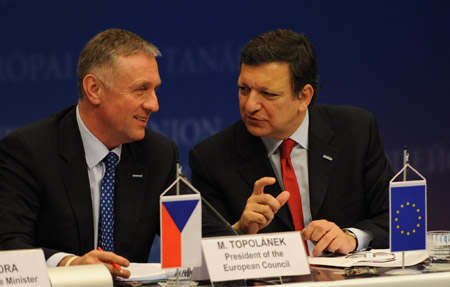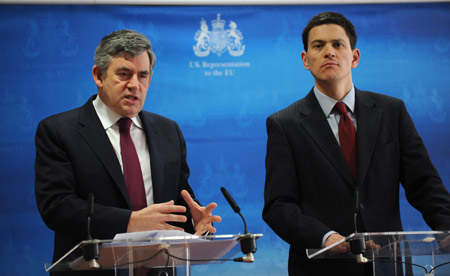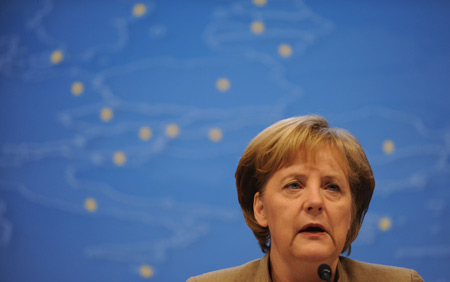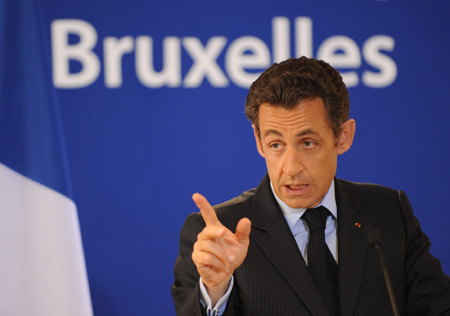European Union (EU) leaders concluded their two-day spring summit on Friday with the adoption of a common position for the upcoming Group of 20 (G20) financial summit in London.
The leaders made it clear that the EU will take a different approach to the financial and economic crises instead of following the steps of the United States.
|

|
|
EU rotating Presidency Czech Prime Minister Mirek Topolanek (L) talks with European Commission's President Jose Manuel Barroso during the press conference after the first day meeting of EU spring summit in Brussels, capital of Belgium, March 19, 2009. [Xinhua] |
U.S. officials had repeatedly called on the EU countries to step up fiscal stimulus to boost demand as a way out for the current financial crisis. But EU leaders did not yield to this line.
The conclusions of the EU summit called for the strengthening of coordination on fiscal stimulus measures, and the implementation of the existing package. There was no mention of the need to commit more money to stimulate the economy.
|

|
|
British Prime Minister Gordon Brown (L) and Foreign Secretary David Miliband attend a press conference held after the close of the two-day European Union spring summit in Brussels, capital of Belgium, March 20, 2009. [Xinhua] |
Czech Prime Minister Mirek Topolanek, whose country holds the rotating EU presidency, said EU leaders felt that they should not take orders from the United States, and that the EU's priority is to implement the existing stimulus plan and to observe its effectiveness.
In fact, EU leaders are also facing internal pressure to increase the economic stimulus. But they were adamant.
On the eve of the EU summit, the International Monetary Fund (IMF) released its latest projections, which indicated that the euro zone economy will shrink 3.2 percent this year, a situation far worse than originally estimated.
|

|
|
German Chancellor Angela Merkel addresses a press conference held after the close of the two-day European Union spring summit in Brussels, capital of Belgium, March 20, 2009. [Xinhua] |
With the economy sliding into recession, the EU's employment is rapidly deteriorating, giving increasing pressure to governments. As the EU summit was going on, hundreds of thousands of French workers took to the streets, launching a nationwide strike for a second time this year. On the eve of the summit, EU trade unions also urged the EU to increase investment in order to create more jobs.
But unlike the United States, which seems to be able to borrow endlessly, EU member states are subject to strict fiscal discipline under EU rules. They must suppress deficits to ensure stable and sustainable economic growth.
As deficits are approaching or exceeding the ceiling set up by the EU, national governments find themselves in a very difficult position to give more money as stimulus.
|

|
|
French President Nicolas Sarkozy addresses a press conference held after the close of the two-day European Union spring summit in Brussels, capital of Belgium, March 20, 2009. [Xinhua] |
The biggest resistance within the EU was its largest economy --Germany. German Chancellor Angela Merkel warned ahead of the EU summit that the differences across the Atlantic posed a threat to global recovery efforts and that countries should not compete with the sizes of their economic stimulus packages.
Instead of increasing economic incentives, the EU is clearly more interested in strengthening the international financial supervision and reform of the international financial institutions, in order to better guard against a repeat of the financial crisis.
On the eve of the EU summit, Merkel and French President Nicolas Sarkozy wrote a letter to the Czech EU presidency and European Commission President Jose Manuel Barros, emphasizing that the EU common position at the London summit should focus on building a new international financial system. Their position has been taken by all EU leaders.
In a long list of the EU common position, the leaders devoted much space to the strengthening of international financial regulation and reform of international financial institutions.
As a general principle, the EU wants supervision and regulation of all sectors and products that may lead to risks in the financial markets -- hedge funds, credit rating agencies, credit derivatives, tax havens, executive pay, corporate capital requirements and accounting standards.
The EU supports reform of the IMF to adapt it to the current global economic pattern. Given the growing weight of emerging economies in the global economy, the EU favors the redistribution of IMF voting rights to give emerging economies more say. The EU leaders also agreed to provide the IMF with 75 billion euros to increase its capacity.
Despite the common position, how far the EU can go in terms of international financial institution reform remains unclear. First of all, a threat comes from the United States. Analysts have pointed out that the United States, by giving emphasis to economic stimulus, was trying to distract the attention of EU on supervision and regulation of international financial institutions.
As the prime source of the financial crisis, the laisser-faire approach of the United States has been under fire. Washington also wants supervision and oversight, but it may not be in complete agreement with the EU as to what extent regulation shall be strengthened.
Secondly, there is doubt about how seriously the EU is considering giving more powers to emerging economies and developing countries in key international financial institutions.
At a G20 finance ministers' and central bankers' meeting on March 14, Brazil, Russia, India and China -- known as "BRIC" countries -- called for immediate measures to expand the four nations' powers in the IMF. There seemed to be disagreements even within the EU's big three -- Britain, France and Germany. Germany and France now also worry that Britain might be leaning toward the United States at the London summit, thus undermining the common EU position.
(Xinhua News Agency March 22, 2009)